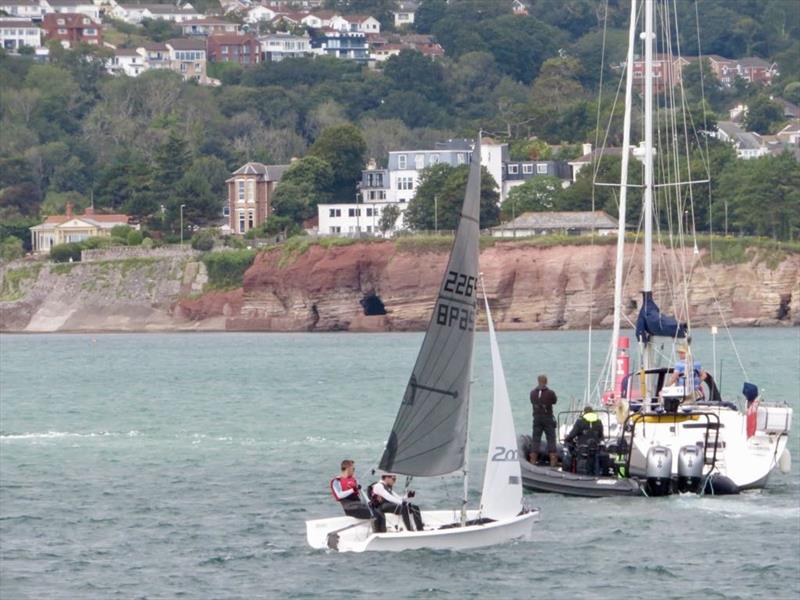
2000 class Nationals - a first timer's view
by Oliver and Elliott Thompson 21 Sep 2024 10:34 BST
5-9 August 2024

Oliver and Elliott Thompson during the 2000 class Nationals at Torbay © Darren Thompson
Attending any large event can be a daunting prospect, and your first Nationals and large fleet racing event is sure to evoke a whirlwind of emotions - excitement, nerves, and pressure, to name a few.
We've participated in many larger events, including the Lord Birkett and the Great North
Asymmetric Challenge, but the 2024 2000 National Championship was set to be our largest
fleet racing event yet — and it certainly delivered!
Having bought our first 2000 in 2019, we've been part of the class for a few years now,
competing on the circuit since 2022 when the first Latitude Series was introduced. This was a
milestone moment for the class, as it marked the first time events were being held further north.
We even hosted the inaugural event of the Latitude Series in 2022 at our home club, West
Riding Sailing Club.
We arrived in Torbay on Friday, got the boat rigged, and made sure everything was in working
order. On Saturday, we hit the water ahead of the official racing start on Sunday, allowing us
time to practice with a few others and get a feel for the bay. Looking back, this was a smart
decision, as it helped ease the nerves when Sunday morning finally arrived.
When Sunday did come around, we spent the morning ensuring the boat was perfectly
prepared, allowing us to focus solely on the racing and conditions. Having never raced in such a
large fleet before, we were eager to see how we stacked up against the other sailors. We were
pleased with our first day's results, finishing with a 14th and a 9th.
The next two days of racing, Monday and Tuesday proved to be challenging and a steep
learning curve. We recorded finishes of 18th, 16th, 20th, and 11th — results that taught us a lot
about racing in such a competitive fleet of 45 boats.
Wednesday was a much-needed lay day, giving us a chance to rest and regroup.
Thursday brought the windiest conditions of the week, which deterred many boats from heading
out, leaving their crews warm and dry in the yacht club. We, however, launched early to assess
the conditions and adjust our rig setup accordingly. As a lighter crew, we anticipated struggling
on the heavy wind days. However, with a few tweaks to the rig and controls, we managed to
stay competitive with the heavier crews. Our strategy was to hang on upwind and hold our
position, then use the downwind legs to start gaining places. We ended the day with a 15th and
a 6th, moving us up to 14th overall with one day of racing left.
By Friday morning, the wind had calmed, prompting yet another adjustment to our rig setup to
suit the new conditions. Two strong final races resulted in a 16th and our best result of the
Nationals — a 5th place finish. This brought us to 12th overall, securing 1st in the Silver Division
and, because it was our first Nationals, 1st in the Newcomer Division.
So, what did we learn?
Take each race as it comes. If things aren't going well, focus on the next small win — like
overtaking the boat ahead. In the first race on Thursday, we had a terrible start and a poor first
beat, rounding the windward mark in around 30th place. But instead of trying to make a big,
risky move, we concentrated on gaining one boat at a time. By doing this, we managed to climb
back up to 16th. It's tempting in these situations to aim for a big, game-changing play, but often
the best approach is to stick with the fleet and look for small, consistent gains — unless there's
an obvious opportunity elsewhere. As a light crew, we were fortunate to have an advantage
downwind, where we could sail faster and deeper than most, which definitely worked in our
favour.
Another lesson we learned was the value of getting out on the course early. This gave us a feel
for where to expect shifts and helped us be more prepared when the racing began.
Lastly, it's crucial to stay clean and clear. Avoid getting caught in tacking battles with other
boats. Think strategically and focus on getting into clear air where you can execute your own
race plan without interference.
The 2000 is a competitive one-design class, with boats old and new competing on a level
playing field. The class and its sailors are an exceptionally helpful and friendly bunch. Everyone
is open about sharing their setups, tips, and tricks, always supporting each other in becoming
faster and more competitive. So, if you're thinking of getting a 2000 or looking for a class to
jump into, the 2000 should be at the top of your list.
This experience was an unforgettable journey for us, filled with challenges, learning, and
camaraderie, and we're looking forward to the rest of the 2024 session and the next 2000
National Championship in 2025.
To find out more about how you can take part in Opens and Travelling Series events at West Riding Sailing Club, around the UK and abroad visit www.wrsc.org.uk. Start your journey today.